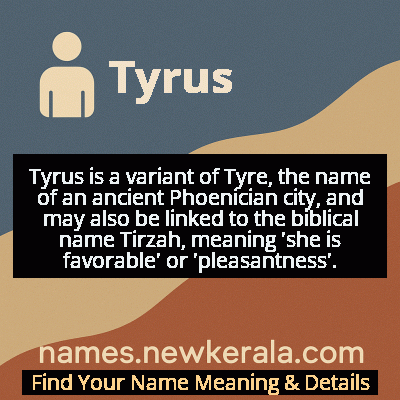Tyrus Name Meaning & Details
Origin, Popularity, Numerology Analysis & Name Meaning of Tyrus
Discover the origin, meaning, and cultural significance of the name TYRUS. Delve into its historical roots and explore the lasting impact it has had on communities and traditions.
Name
Tyrus
Gender
Male
Origin
Christian
Lucky Number
4
Meaning of the Name - Tyrus
Tyrus is a variant of Tyre, the name of an ancient Phoenician city, and may also be linked to the biblical name Tirzah, meaning 'she is favorable' or 'pleasantness'.
Tyrus - Complete Numerology Analysis
Your Numerology Number
Based on Pythagorean Numerology System
Ruling Planet
Uranus (Rahu)
Positive Nature
Strong sense of order, loyal, practical, and disciplined.
Negative Traits
Stubborn, overly serious, rigid, and prone to feeling restricted.
Lucky Colours
Blue, gray.
Lucky Days
Saturday.
Lucky Stones
Blue sapphire.
Harmony Numbers
1, 7, 8.
Best Suited Professions
Managers, engineers, accountants, organizers.
What People Like About You
Dependability, discipline, practicality.
Famous People Named Tyrus
Tyrus Thomas
Professional Basketball Player
NBA player known for defensive prowess with Chicago Bulls and Charlotte Bobcats
Tyrus Wong
Artist and Animator
Created the iconic visual style for Disney's Bambi and contributed to Warner Bros animation
Tyrus (George Murdoch)
Professional Wrestler and TV Personality
WWE superstar and Fox News contributor known for charismatic entertainment career
Name Variations & International Equivalents
Click on blue names to explore their detailed meanings. Gray names with will be available soon.
Cultural & Historical Significance
Extended Personality Analysis
People named Tyrus typically exhibit a fascinating blend of traditional strength and innovative thinking. Drawing from the name's ancient maritime origins, they often demonstrate exceptional adaptability and problem-solving skills, able to navigate complex situations with the same expertise that Tyrian sailors navigated the Mediterranean. Their personality tends to balance the steadfast determination of Tyrone with the visionary leadership of Cyrus, creating individuals who are both practical and imaginative. Tyrus bearers often show entrepreneurial spirit and diplomatic abilities, reflecting the trading heritage of ancient Tyre—they're natural negotiators who understand multiple perspectives. Many develop strong technical or artistic talents, with a particular aptitude for combining different fields or creating new syntheses. They typically value knowledge and cultural exchange, often becoming bridges between different social groups or intellectual traditions. While they can be independent and self-reliant, they also understand the importance of community and collaboration, much like the city-states of antiquity that thrived through trade networks and cultural exchange. Their resilience in facing challenges often inspires others, and they tend to leave lasting impacts through both personal relationships and professional accomplishments.
Modern Usage & Popularity
In contemporary naming practices, Tyrus occupies an interesting niche as both a distinctive choice and one with deep historical roots. Since the 1990s, the name has maintained consistent but modest usage, appealing to parents seeking strong, masculine names that are familiar yet uncommon. Its popularity received significant boosts from public figures like WWE wrestler Tyrus and NBA player Tyrus Thomas, who brought the name into mainstream awareness. Modern usage trends show particular strength in the American South and among families with interest in biblical names or classical history. The name's appeal lies in its perfect balance—it sounds modern and approachable while carrying thousands of years of history. Current naming data indicates Tyrus ranks around position 850 in the United States, with approximately 200-250 boys receiving the name annually. It's particularly popular among educated urban families and those with multicultural backgrounds who appreciate the name's ability to bridge different cultural traditions. The name's stability in usage suggests it may see gradual increased popularity as parents continue seeking names with substance and character rather than fleeting trends.
Symbolic & Spiritual Meanings
Symbolically, Tyrus embodies the powerful concept of endurance through transformation. The ancient city of Tyre was famously built on both an island and mainland, representing the balance between security and accessibility, tradition and innovation. The purple dye for which Tyre was famous symbolizes royalty, spirituality, and rare value—qualities often associated with people bearing this name. As a maritime power, Tyre represents journey, exploration, and the courage to venture into unknown territories, both literally and metaphorically. The city's repeated destruction and rebuilding cycles add layers of meaning about resilience, adaptation, and the ability to create beauty from ruins. In its modern blended form, Tyrus combines the earthy stability of Tyrone (connected to land and heritage) with the solar royalty of Cyrus (associated with light and leadership). This creates a rich symbolic tapestry representing individuals who can honor tradition while embracing progress, who understand both roots and wings. The name ultimately symbolizes cultural synthesis—the beautiful results that emerge when different traditions and ideas come together in creative harmony.

